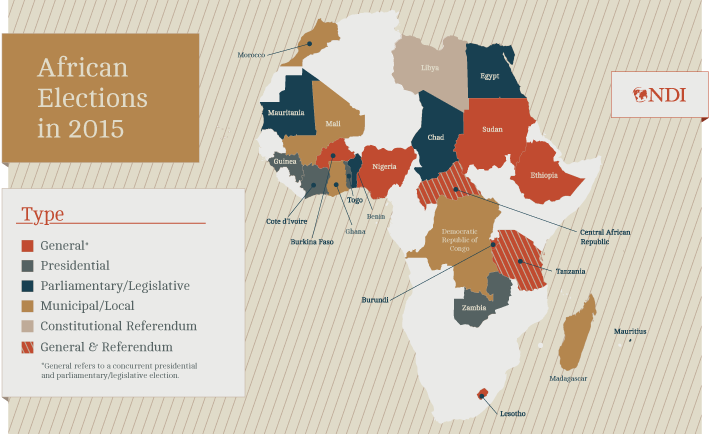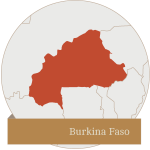Editor's Note: Election dates mentioned in this blog post were correct on the day of publication, however election dates are subject to change. For up-to-date information on upcoming elections, please check NDI's Global Elections Calendar.
Between January 2015 and December 2016, African countries will organize more than 35 presidential and legislative elections, and the outcomes have the potential to spark a sea change for the continent. The first of these polls took place in January with the Zambian presidential election after the unexpected death of President Michael Sata.
The March 28 elections in Nigeria can be seen as a harbinger for electoral events to come over the next year in Africa and for democratic development throughout the region. For the first time since independence in 1960, Nigerian voters peacefully voted to transfer political power from one party to another. Given Nigeria’s checkered electoral history filled with violence, rigging and lack of a viable opposition party since military rule ended in 1999, Nigeria’s recent success story is a positive sign for its democratic consolidation and a potential game-changer for other African elections.
The odds for a successful outcome were stacked against Nigeria. However, these challenges seemed to galvanize Nigerian voters and spurred them to take ownership of a hard won democratic process after decades of military rule. Nigeria beat the odds in the most competitive elections the country has ever seen.
At her Africa Policy Forum on the impact of 2015 elections in Africa, U.S. Congresswoman Karen Bass, D-CA, said, “It’s incumbent upon all of us who care about Africa to celebrate the good news.” The success of the polls in Nigeria gives cause for hope.
The determination of Nigerians to take part in the democratic process and to both participate peacefully and accept the outcome should be commended. If Nigeria is indeed a model for the subregion, I hope that the lessons learned and positive momentum will carry over to other critical elections scheduled this year. The elections in Burundi, Côte d’Ivoire, Burkina Faso, the Democratic Republic of the Congo (DRC), the Central African Republic (CAR) and Guinea, among others, will show whether Nigeria is an anomaly, or the beginning of broader democratic progress across the region.
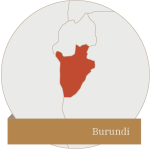 1) Burundi at risk of democratic backslide
1) Burundi at risk of democratic backslide
In Burundi, after a decade of relative peace following 12 years of armed conflict and ethnic polarization, President Pierre Nkurunziza’s National Council for the Defense of Democracy – Forces for the Defense of Democracy (CNDD-FDD) party recently designated him as its presidential candidate for a third term. The CNDD-FDD argued that a constitutional change to extend term limits to three terms was unnecessary given that the president was indirectly elected by the legislature for his first term. With mounting violence in advance of the polls, Burundi is at risk of democratic backsliding during its legislative and presidential elections scheduled for May 26 and June 26, respectively.
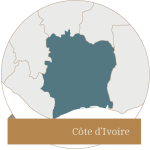 2) Political polarization in Côte d’Ivoire could limit political participation
2) Political polarization in Côte d’Ivoire could limit political participation
Political violence in Côte d’Ivoire leading up to presidential polls scheduled for Oct. 25, a run off on Nov. 22 and parliamentary elections in December 2016 is likely to be isolated. But political polarization and scars from post-election violence in 2010 will make national reconciliation a challenge. The country’s three major political parties will likely need to form coalitions to win the majority vote. President Alassane Ouattara is expected to win a second term.
3) In Burkina Faso, a chance to redefine the political landscape
The political landscape in Burkina Faso has already seen dramatic shifts in the last year, well before presidential and legislative polls scheduled for Oct. 11. After the much-publicized ouster of President Blaise Compaoré on Oct. 31, 2014, weeks of demonstrations gave way to a military-approved plan for a civilian-led transitional government in place until the October elections. In October, Burkinabe people will have an opportunity to redefine their political landscape and elect a new leader through what are expected to be highly competitive elections.
4) A slippery slope for the Democratic Republic of the Congo
The DRC has local and provincial polls scheduled for Oct. 25 followed by indirect senatorial elections on Jan. 17, 2016, and legislative and presidential polls on Nov. 27, 2016. Deteriorating security, extreme poverty and the failed 2009 peace deal between the Kabila government and National Congress for the Defense of the People all threaten stability. If President Joseph Kabila decides not to respect his term limits, democratic progress could continue to slide backward and disagreement between ruling and opposition parties over the timing of local elections could lead to boycotts by the opposition. Continued high-level diplomatic attention focused on the DRC in the run up to the elections, like that from President Obama, could help prevent further backsliding.
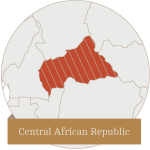 5) The Central African Republic faces a difficult path forward
5) The Central African Republic faces a difficult path forward
Continuous insecurity in the CAR has displaced close to one million people. With a constitutional referendum, presidential and parliamentary elections and runoff presidential and parliamentary elections all scheduled for 2015, the divided country faces deep challenges. Previous elections in the CAR have been riddled with problems. These problems combined with the government's persistent neglect of the country's outlying regions, continued insecurity, and poverty have been barriers to improved governance and democratic progress in the CAR. The United Nations is currently running a peacekeeping operation in the CAR previously started by the African Union in the hopes of stabilizing the country.
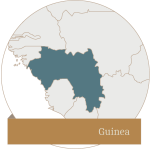 6) Pinning down a date in Guinea
6) Pinning down a date in Guinea
Guinea has a presidential election scheduled for Oct. 11, 2015, with local polls delayed until early 2016. Existing political tensions between the ruling and opposition parties have escalated mainly due to election scheduling. Election timing is critical in Guinea and continuous delays and changes to the electoral calendar have stoked frustrations. Opposition demonstrations recently resumed accompanied by violence and opposition party spokesperson Aboubacar Sylla was attacked. The lead up to October is expected to be tense; however, there is still time for tensions to abate.
Last month’s elections in Nigeria captured the enthusiasm of voters and showed their determination to claim ownership of their democracy. Election outcomes in 2015 and 2016 have the potential to impact democratic development across Africa now and for decades to come. Voters in these critical elections countries should take note of Nigeria’s example. As Nigerian citizens know, democracy is a hard-fought and hard-won process. However, even if elections themselves are successful, democracy does not begin or end at the polling station. Voting is one part of the democratic process.
Click on the country name below to learn more. View Full Screen

